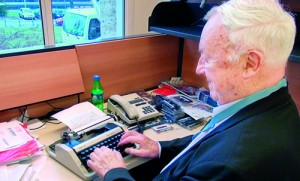86-year-old journalist and his typewriter
Geneva- A seldom-heard noise is emanating from a small cubicle at the far end of Press Room One at the Palace of Nations, the imposing home of the United Nations in Geneva.
It’s the sound of metal keys clattering against paper, punctuated frequently by the muted ping of a small steel bell.
Gordon Martin, UN Correspondent for Vatican Radio, is writing his latest dispatch on the day’s developments at the Geneva 2 peace talks on a 40-year-old Remington Performer manual typewriter.
The UN’s second largest office has been Gordon Martin’s news patch for a quarter of a century. At the age of 86, he is still reporting on proceedings in the labyrinthine complex of buildings.
In the age of social media and digital diplomacy, Gordon Martin is a resolutely analogue journalist.
“I don’t have a mobile telephone,” he tells me with a slight hint of pride.
“I don’t understand a lot of modern gadgetry and I think sometimes gadgets get in the way of clear use of the English language.”
For the Holy See’s reporter in Geneva, replacing his typewriter with a laptop or an iPad would be tantamount to heresy.
After all, if it’s not broken then why fix it?”I’ve never tried anything else,” he admits with a throaty chuckle.
Rather than a relic from a bygone age of journalism, Gordon Martin could perhaps be regarded as something of a visionary.
Suspicion of technology is back in vogue in diplomatic circles following Edward Snowden’s revelations about electronic eavesdropping by the US National Security Agency. Russian media outlets reported last year that a Kremlin agency responsible for protecting high-ranking officials had bought a batch of ageing typewriters to prevent its communications from being hacked by Western powers.
Martin stumbled into journalism by accident after studying classics and modern languages at Oxford University, followed by a spell as a teacher. In 1955, destined for a career in the wine business, he made a last-minute decision to take up a traineeship with the Reuters news agency instead. He could speak Italian and so was posted to Rome at the height of the glamorous era of La Dolce Vita.
During one early assignment, to Madagascar, he learned one of the most important lessons for any young journalist. Personal contacts can be a reporter’s most valuable commodity.
“I met a charming French lady who was a very good ballroom dancer and there was nothing the Minister of Information in Madagascar liked more than dancing the Charleston with this lady,” he recalls.
“She said to the minister, ‘Either you give a contract to Mr Martin from Reuters (giving him permission to set up an office on the island) or I will never dance with you again.’ The minister immediately summoned me to his office and I signed the contract.”
After 10 years with Reuters, Martin took up the post of Latin America correspondent for the BBC. He reported from every country in the region – from Bolivia after the execution of Che Guevara, to Fidel Castro’s Cuba.
After the death of President Nasser of Egypt in 1970 he moved to Cairo.
Every word he wrote had to be approved by the authorities prior to broadcast.
“First of all I would go to the censor’s office and they’d read my script,”he says.
“Sometimes they would say, ‘Mr Martin you can’t say that.’ I’d say, ‘Well I saw that with my own eyes’. But that didn’t matter if they decided I couldn’t say it.
“Then I’d go to Cairo Radio, where they’d already have a copy of my script as cleared by the censors, and I’d do my broadcast to London.”But the clattering sound of Gordon Martin’s typewriter won’t be echoing around the UN press room for much longer. After a long and distinguished career as a foreign correspondent, the day is approaching when he’ll walk slowly and deliberately along the corridor from his office to the United Nations radio studio to send his final report to Rome.
“I think this year I’ll probably give up altogether because I can’t walk very well,” he says sadly. “I have trouble with my legs and I find that I don’t have as much energy as I should have.
“I think I’ll just go on working until the end of this year and then call it a day.”
The chances of Gordon Martin becoming a late convert to Facebook and Twitter seem remote. But until he finally hangs up his UN press credentials he’ll carry on practising old-fashioned journalism in the same way he has done for almost 60 years – talking to sources, asking questions and making sense of the world on behalf of his listeners.
“It’s still up to the correspondent to decide what is relevant and what is just nonsense,” he says. “And it’s up to the listener to decide whether he is getting an accurate picture or whether it’s just chatter.”


